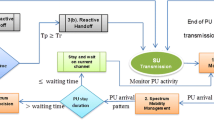Abstract
Cognitive radio technology provides opportunistic wireless spectrums access for the secondary users (SUs) while primary users (PUs) are dormant. By emergence of a PU in the cognitive radio networks, SUs are required to vacant the channel by using spectrum handoff approaches to avoid any collision. Providing an efficient and flexible coordination protocol for spectrum handoff is a challenging step. In this paper, we propose a novel proactive spectrum handoff protocol called multiple-single rendezvous (MSRV) protocol which uses multiple rendezvous (MRV) and single rendezvous (SRV) coordination policy to provide a higher throughput and context adaptability. MRV coordination policy has the advantage of negotiating in different channels simultaneously and avoid single control channel congestion. On the other hand, in order to share the PUs’ channel usage history information between the SUs for predicting channels’ availability, it is necessary to utilize a SRV coordination scheme. The proposed MSRV protocol improves the average throughput of the SUs and decreases the average service time comparing to the other existing proactive spectrum handoff protocols. Moreover, MSRV protocol gives priority to the handoff SUs which decreases service times. It is an crucial property for the delay sensitive applications. Our proposed protocol achieves 20% throughput and 13.7% average service time improvement in 1.25 and 10 (pkts/s) PUs’ traffic load compared to the SRV proactive spectrum handoff protocol proposed by Mehrnoush et al., respectively.






Similar content being viewed by others
References
Akyildiz, I. F., Lee, W.-Y., Vuran, M. C., & Mohanty, S. (2006). Next generation/dynamic spectrum access/cognitive radio wireless networks: A survey. Computer Networks, 50(13), 2127–2159.
De Domenico, A., Strinati, E. C., & Di Benedetto, M.-G. (2012). A survey on MAC strategies for cognitive radio networks. IEEE Communications Surveys and Tutorials, 14(1), 21–44.
Wang, L.-C., & Wang, C.-W. (2008). Spectrum handoff for cognitive radio networks: Reactive-sensing or proactive-sensins? In IEEE international performance, computing and communications conference (IPCCC) (pp. 343–348).
Wang, C.-W., Wang, L.-C., & Adachi, F. (2010). Modeling and analysis for reactive-decision spectrum handoff in cognitive radio networks. In IEEE global telecommunications conference (GLOBECOM 2010) (pp. 1–6) IEEE.
Song, Y., & Xie, J. (2012). Prospect: A proactive spectrum handoff framework for cognitive radio ad hoc networks without common control channel. IEEE Transactions on Mobile Computing, 11(7), 1127–1139.
Xie, X., Yang, G., & Ma, B. (2011). Spectrum handoff decision algorithm with dynamic weights in cognitive radio networks. In Global mobile congress (GMC) (pp. 1–6) IEEE.
Wang, L.-C., Wang, C.-W., & Chang, C.-J. (2012). Modeling and analysis for spectrum handoffs in cognitive radio networks. IEEE Transactions on Mobile Computing, 11(9), 1499–1513.
Li, L., Shen, Y., Li, K., & Lin, K. (2011). TPSH: A novel spectrum handoff approach based on time estimation in dynamic spectrum networks. In IEEE international conference on computational science and engineering (CSE) (pp. 345–350) IEEE.
Liu, F., Xu, Y., Guo, X., Zhang, W., Zhang, D., & Li, C. (2013). A spectrum handoff strategy based on channel reservation for cognitive radio network. In International conference on intelligent system design and engineering applications (ISDEA) (pp. 179–182) IEEE.
Song, Y., & Xie, J. (2010). Proactive spectrum handoff in cognitive radio ad hoc networks based on common hopping coordination. In IEEE conference on computer communications workshops INFOCOM (pp. 1–2) IEEE.
Song, Y., & Xie, J. (2010). Common hopping based proactive spectrum handoff in cognitive radio ad hoc networks. In IEEE global telecommunications conference (GLOBECOM) (pp. 1–5) IEEE.
Mehrnoush, M., & Vakili, V. T. (2013). Proactive SRV spectrum handoff protocol based on gcs scheme in cognitive radio adhoc network. In International journal of power control signal and computation (IJPCSC) (pp. 1–8) IJPCSC.
Pham, C., Tran, N. H., Do, C. T., Moon, S. I., & Hong, C. S. (2014). Spectrum handoff model based on hidden markov model in cognitive radio networks. In International conference on information networking (ICOIN) (pp. 406–411) IEEE.
Nejatian, S., Syed-Yusof, S., Latiff, N., & Asadpour, V. (2014). Push: Proactive unified spectrum handoff in CR-MANETs. In International conference on advanced information networking and applications (AINA) (pp. 33–40) IEEE.
Mehrnoush, M., Fathi, R., & Vakili, V. T. (2015). Proactive spectrum handoff protocol for cognitive radio ad hoc network and analytical evaluation. IET Communications, 9(15), 1877–1884.
So, W., Walrand, J., & Mo, J., et al. (2007). McMAC: A parallel rendezvous multi-channel mac protocol. In IEEE wireless communications and networking conference (WCNC) (pp. 334–339) IEEE.
Mo, J., So, H.-S. W., & Walrand, J. (2008). Comparison of multichannel MAC protocols. IEEE Transactions on Mobile Computing, 7(1), 50–65.
Lo, B. F. (2011). A survey of common control channel design in cognitive radio networks. Physical Communication, 4(1), 26–39.
Tzamaloukas, A., & Garcia-Luna-Aceves, J. (2000). Channel-hopping multiple access. In IEEE international conference on communications (ICC) (Vol. 1, pp. 415–419) IEEE.
Goel, A., Abeni, L., Snow, J., Krasic, C., & Walpole, J. (2002). Supporting time-sensitive applications on general-purpose operating systems. In Proceedings of the 5rd symposium on operating systems design and implementation (OSDI’02) (pp. 165–180).
Fathi, R., Salehi, M. A., & Leiss, E. L. (2015) User-friendly and secure architecture (UFSA) for authentication of cloud services. In 8th international conference on cloud computing (CLOUD) (pp. 516–523).
Zhang, H., Jiang, C., Mao, X., & Chen, H. H. (2016). Interference-limited resource optimization in cognitive femtocells with fairness and imperfect spectrum sensing. IEEE Transactions on Vehicular Technology, 65(3), 1761–1771.
Author information
Authors and Affiliations
Corresponding author
Rights and permissions
About this article
Cite this article
Mehrnoush, M., Fathi, R. & Vakili, V.T. A distributed spectrum handoff MSRV protocol for the cognitive radio ad hoc networks. Wireless Netw 24, 1831–1839 (2018). https://doi.org/10.1007/s11276-017-1446-9
Published:
Issue Date:
DOI: https://doi.org/10.1007/s11276-017-1446-9




